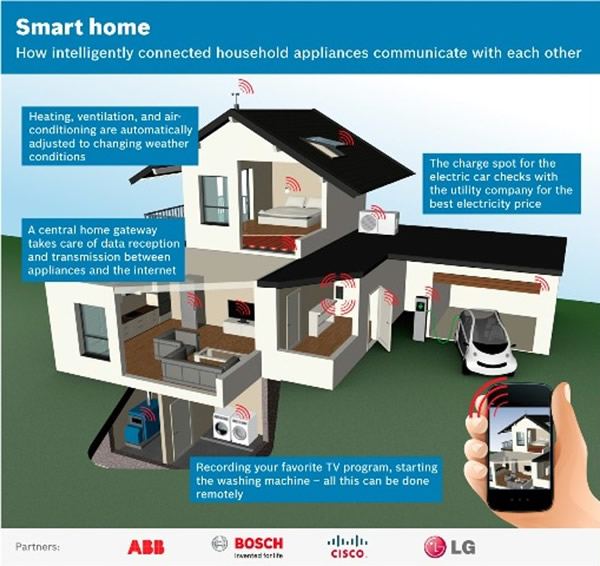Intent to cooperate internationally
Access for other manufacturers and service providers
Certainty for end customers
Different appliances, but just one common standard for data exchange
ABB, Bosch, Cisco, and LG aim to set up a consortium to provide a software platform for smart homes. The companies have now signed a memorandum of understanding to this effect. The plan is subject to approval by the antitrust authorities.

Under the memorandum, the parties intend to develop an open architecture for data exchange. The software platform would allow diverse devices and services to interoperate, and to exchange information with each other. Application software distribution will also be enabled. This will allow appliances and devices made by different manufacturers to be part of home automation, security, healthcare, and entertainment services. A common platform such as this has not been available up to now, making it a challenge for appliances and devices – light switches, motorized roller blinds, washing machines, multimedia equipment, smartphones, and tablets – to communicate with each other or to simply exchange information over the internet in a standardized way. The common platform is one more step toward the internet of things for the home, in which physical objects will be networked.
The software platform is intended to make the standard available to all manufacturers, software developers, and service providers. It is intended to unite diverse services in areas such as energy management, security technology, and convenience and consumer electronics. This will enable new business models: software developers, for example, will be able to develop diverse apps for these areas. And in the future, end-users wanting to have automated control for their electronic appliances in residential buildings will no longer have to choose between different technologies.
Safety, convenience, efficiency
Thanks to sensors and software, for example, a smart home will be able to detect things such as upstairs windows that are still open, and combine this information with weather forecasts on the internet to close the windows and lower the blinds before a thunderstorm breaks. To give another example, during vacations, the controls can switch on lights at random to deter burglars. What is more, if a motion sensor is triggered, the smart home can alert a security service and feed a video stream to the owner’s smartphone.
Diverse appliances, but one language
The above applications are already possible today. However, each of them requires a technical solution of its own, and the various solutions are not always compatible with each other. ABB, Bosch, Cisco, and LG intend to develop a common language that allows the appliances to communicate with each other. Under the standards that the consortium intends to establish, and that would be available to all manufacturers, appliances would be connected to a home gateway, which itself would be connected to the internet and a software platform. In this way, the services of different providers can interoperate. In the future, anyone who buys a new refrigerator, washing machine, heating system, or other type of electrical appliance featuring the consortium’s certificate of compatibility can expect that the appliance will interact and be compatible with the other appliances already in their smart home.
Technology
Once these open standards have been developed, the parties’ aim is that these compatible appliances will communicate with each other over radio networks such as WiFi, ZigBee, and other wired connections like KNX. A central control unit in the building manages all the individual appliances, and also creates a secure internet link. Any control unit can perform this function, regardless of manufacturer, provided the unit runs on software that satisfies the relevant standard. Independent software developers can also program new apps that allow the central control unit, the heating and air-conditioning, and the electrical appliances throughout the building to be controlled over the internet. The software platform’s sophisticated security architecture helps to ensure that only authorized persons can access the functions in any one smart home.
About the smart home
“Smart home” is used to describe buildings whose appliances are connected with each other, and thus offer their occupants new functions and services. In most cases, these can be controlled remotely over the internet. The terms “smart house,” “smart living,” and “e-home” are sometimes also used to describe the same approach. Whatever the term used, the meaning is the same. One of the benefits of such intra-connectivity in smart homes is efficient energy use, an important issue for the future. For example, if energy prices are available on the internet, homes can react automatically to them to cover their needs as cost-effectively as possible – and this without their occupants themselves having to act. The washing machine would then start when electricity is cheap. A further central issue in smart homes is security through things such as condition monitoring. Smart homes will also make ambient assisted living possible, for example in homes that are adapted to the needs of the elderly.
“Let’s take our homes into the internet!” says Dr. Stefan Hartung, member of the board of management of Robert Bosch GmbH. “An open standard for data exchange is the basis for this. At the same time, our innovative and beneficial services can improve quality of life in the homes of the future, and allow us to use energy efficiently, safely, and comfortably, both in our homes and our cars.”
“This consortium represents an opportunity to bring together a variety of business ecosystem partners, all working together to help make the Internet of Things for the home a reality,” says Jesper Andersen, Senior Vice President and General Manager, Cisco Service Provider Video Software & Solutions Group. “Cisco is looking forward to participating in the consortium and creating a standard that allows consumers to experience a connected home.”
“This consortium is a solution that maximizes collaboration and customer value,” says Byunghoon Min, Senior Vice President, Convergence R&D Laboratory, LG Electronics. “LG Electronics will present never experienced smart home life to customers by creating synergy within the consortium.”










